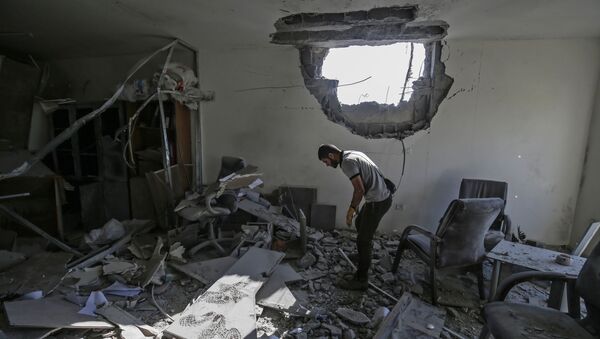The Islamic Jihad terror group has promised to retaliate by launching more rockets on Israeli cities following Israel Defence Forces' earlier attack that killed one of the group's top leaders, Bahaa Abu Al-Atta.
This is after more than 50 rockets have been launched from the Gaza Strip since the early hours of Tuesday morning, with the Iron Dome Aerial defence system intercepting 20 of them.
Abu Al Atta's funeral is currently underway in Gaza and Mkhaimer Abu Seada, a political analyst based in Gaza, who's been monitoring the situation closely, warns that escalation will continue after the burial of the leader.
War is Not on the Table?
"Tensions might escalate for a day or two but it is not going to deteriorate into another full-scale war. This is not only because of the efforts made by the Egyptians, who will be mediating between Israelis and the Palestinians trying to avoid another round of hostilities but also because it is not in Hamas' interests," he says.
Hamas, claims the expert, remembers the destruction that Israel caused in 2014 during its operation Protective Edge. In an attempt to put an end to the constant shelling of Israeli cities, Israeli forces destroyed Gaza's infrastructure, causing $7.8 billion of damage, and leaving more than 100,000 Palestinians homeless – according to the estimates of the Palestinian Authority.
The political analyst believes that the public will never back Hamas for opening another confrontation with Israel because the situation in the region has not improved over the years with the World Bank reporting that there has been an increase in poverty and unemployment, with the latter reaching 47 percent in the second quarter of 2019.
"People are tired of the dire economic situation and the poverty surrounding them," he says.
A 2018 poll, conducted by the Palestinian Center for Policy and Survey Research, backs Abu Seada's claim, with 61 percent of Gazans supporting a long-term cessation of violence between Israel and Hamas.
But the expert believes gaining public support is not the only reason for Hamas' hesitation."Hamas believes that another round of hostilities will play into the hands of (Prime Minister Benjamin) Netanyahu and that's a present they don’t want to give him," he stated, suggesting that Netanyahu is trying to boost his popularity among Israelis ahead of a potential general election in early 2020.
United We Stand?
But Hamas is not planning to sit idly by. Earlier, the group issued a statement saying that the assassination of the Islamic Jihad militant "will not go unpunished," giving a green light to the forces of the Islamic Jihad to go ahead with the launch of the rockets.
In addition, two weeks ago, in his address to supporters in Gaza, the leader of Hamas Yehiya Sinwar warned that his group will rain rockets on Israel for six consecutive months if Israel continues to escalate the situation.
"In his speech Sinwar boasted that the armed forces in Gaza comprised of 70,000 fighters. This included the forces of the Islamic Jihad and other factions. But that doesn’t mean Sinwar will want to use all his forces against Israel. The ball is now in Hamas' court and they will need to decide whether to join forces with Islamic Jihad or swallow the pill," he said, adding that Hamas' leadership might choose to join forces with the rival group only if their own militants are targeted by Israeli forces.
Yet, Israel seems to be trading carefully. Since the early morning, Israel has killed three people belonging to Islamic Jihad, Palestinian sources reported. No Hamas militants have been targeted, and Abu Seada believes that this was deliberate.
"Israel doesn't want a war with Hamas, that's why they only target militants and targets associated with the Islamic Jihad," he concluded.

